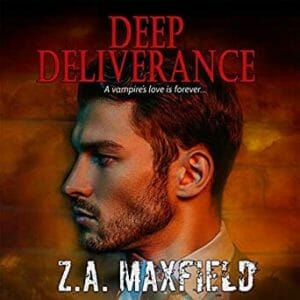Note: There are spoilers for books one and two, Deep Desire and Deep Deception in this review.
This third book in Z.A. Maxfield’s Deep trilogy opens a few months after the life-changing events that took place at the end of book two, Deep Deception. A tragic accident left Dr. Adin Tredeger near death and the only way to save his life was to turn him (into a vampire) – something he had steadfastly refused and made very clear he didn’t want. The discovery of what had been done naturally shook Adin to the core, and when Deep Deliverance opens, he and his lover, five-centuries old vampire Donte Fedeltà, are holed up in deepest Colorado in almost complete isolation. Adin is angry, hurt and furious with Donte; he still loves him deeply but hates him for his part in turning him, and continues to refuse to learn about the supernatural world of which he is now a part. He is adamant that he will not feed from humans (the vampires in these books follow strict rules and only feed from those who agree to become thralls), scared that doing so will sever the final link to the humanity he fears is slipping away from him. And Donte, knowing how close Adin is to breaking point and how fragile their relationship has become, can’t bring himself to push Adin to face the hard truths he really needs to acknowledge.
An unexpected visit from Cristobel Santos – Donte’s long-time (quasi) enemy who has nonetheless struck up an unlikely friendship with Adin – stirs things up a little when he tells Adin that his professional rival, Ned Harwiche, is dead and suggests Adin attends the funeral. While in Los Angeles, Adin can visit his sister – whom he hasn’t seen for months – and be made known to the Council of Kind (vampire bigwigs and officials); as a newly-made vampire it’s a matter of courtesy that he meet with them, but more importantly, it will mark him officially as a member of the Kind community. Adin is surprised when Donte insists he go without him; but Donte knows Adin is conflicted about them and hopes that perhaps some time apart will enable Adin to find his “spark” again, even as he worries that perhaps Adin will realise he doesn’t need Donte any more and won’t return.
Adin agrees to allow Santos and Sean (the Irish vampire we met in the previous book ), to mentor him and they waste no time in administering the sort of tough love that Donte found impossible and which Adin needs if he’s to survive – they insist he learns to feed properly. Adin finally gives in – hating the concept, the act and himself – realising afterwards that once done, he can never go back. And in this, as in so much else, Adin is his own worst enemy. Insisting on mourning for all he has lost rather than at least attempting to adapt to his new existence, he once again falls foul of his tendency to make poor decisions simply because he has refused to acquaint himself with his new reality, its laws, conventions and dangers. Santos and Sean repeatedly question Donte’s failure to “teach” Adin anything – which Adin has to admit is down to him because he didn’t want to know – and as a result he’s woefully ill-equipped to deal with other supernatural creatures and unaware of the importance of getting the seal of approval from the Kind council. His behaviour is likened to that of a petulant toddler more than once as he persists in making unwise choices – until it’s brought home to him very unpleasantly and tragically that his decision to remain ignorant has had wide-ranging consequences for people other than himself.
The story is fast-paced, the banter is witty, the sex is hot, and the stakes for Donte and Adin are higher than they’ve ever been. The journey Adin goes on through all three books – from ignorance of the existence of vampires to ultimately becoming one – is intriguing and well-told, and in spite of his faults, I liked him. His inner conflict is well portrayed, and his fury at what has happened to him is completely understandable; the petulance he exhibits at the beginning of Deep Deliverance indicates how difficult he’s finding it to cope with the changes that were forced on him. Donte is struggling too, however, his usual tone of affectionate exasperation belying a note of genuine worry as he’s forced to watch the man he loves spiralling downward while knowing there’s nothing he can do to help. He is obviously devoted to Adin, which made it all the more frustrating when Adin couldn’t (or wouldn’t) see that because of his narrow focus. But even though Adin still manages to find plenty of trouble, in this book we finally see him taking steps towards making the same leap emotionally as he has made physically, and that the happy ending which had started to look a bit shaky was going to be possible after all.
The problems I had with Caleb Dickinson’s narration in Deep Deception were mostly down to the excruciatingly bad accent he used to portray Bran, a teenager who was supposed to come from the north of England but whose accent placed him in no region in England I’ve ever come across! Fortunately, Bran appears in only one scene in Deep Deliverance and doesn’t have a lot of dialogue, so I didn’t want to rip out my earbuds and stomp on them this time. There’s still a bit of an issue with Sean, whose Irish accent is definitely iffy, but it wasn’t excruciating and again, he’s a secondary character without a huge amount of dialogue, so it was bearable. Those issues apart, though, Mr. Dickinson’s performance is a strong one; he differentiates well between all the characters, his pacing is good and he has maintained consistency in his portrayals of Donte, Adin and Santos across all three books. He might struggle with regional British accents, but he does a good job of making Donte sound like a sexy Italian count, and his use of a standard (RP) English accent for Santos works nicely to differentiate him from Donte and Adin and suits his sardonic demeanour. He’s particularly good at conveying Adin’s inner turmoil – his rage, his despair, his love for Donte and his hatred, too – and in the later part of the story, when tragedy unfolds, Adin’s anguish and guilt. He runs the gamut of emotions in this story, and Mr. Dickinson is right there all the way, which is why I’m grading his narration fairly highly, in spite of the problems I mentioned earlier.
Deep Deliverance brings the Deep trilogy to an exciting, satisfying conclusion. I enjoyed the series as a whole, in spite of my misgivings about the middle book, and would recommend it to those who enjoy paranormal romances, sexy Italian vampires and charming, if over-confident antiquarians who have trouble doing what they’re told!
Caz
Buy Deep Deliverance by Z.A. Maxfield on Amazon




